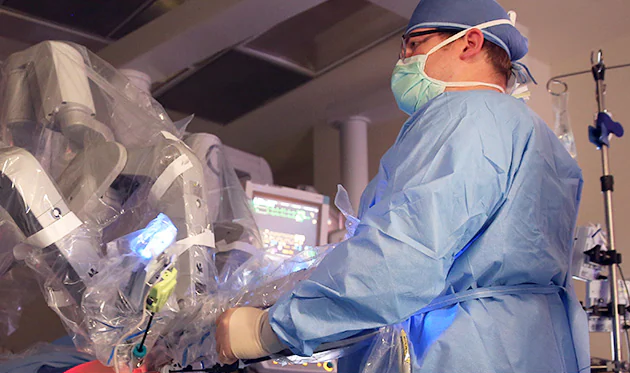Endocrine System Surgery
What is endocrine surgery?
Endocrine surgeries treat disorders that affect glands in your endocrine system. The surgeries mostly focus on diseases that affect your thyroid, parathyroid and adrenal glands. Glands are organs that release hormones into your bloodstream. These hormones send messages to tissues that tell them what to do to keep your body healthy. You may need endocrine surgery if a gland stops working correctly. The gland may send out too much hormone or not enough.
What does your endocrine system do?
Glands in your endocrine system secrete hormones that your body uses for:
- Body growth and sexual development.
- Breathing.
- Metabolism.
- Movement.
- Pregnancy and reproduction.
- Sensory perception.
Endocrine surgery focuses on which glands of the endocrine system?
- Adrenal glands: Your adrenal glands make androgens. These sex hormones affect your reproductive health and body development. Your adrenal glands also make cortisol. Your body releases this hormone during times of stress. A few other hormones, like aldosterone, help regulate your blood pressure.
- Parathyroid glands: This group of four small glands sits behind your thyroid gland. They control your body’s calcium and phosphorous levels, which are vital to bone development.
- Thyroid gland: This butterfly-shaped gland at the front of your neck controls your metabolism. It affects how your body makes heat and uses energy and oxygen.
What are some common endocrine disorders treated with surgery?
Different conditions can affect the health of glands in your endocrine system. You may need endocrine surgery to treat conditions that affect your:
Adrenal glands
- Adrenal tumors.
- Adrenocortical carcinoma.
- Cushing’s syndrome.
- Primary aldosteronism (Conn’s syndrome).
- Pheochromocytoma.
Parathyroid glands
- Hyperparathyroidism.
- Parathyroid adenomas.
- Parathyroid cancer.
Thyroid gland
- Hyperthyroidism.
- Goiter.
- Graves’ disease.
- Toxic (hyperfunctioning) thyroid nodules.
- Thyroid nodules.
- Thyroid cancer.
- PTEN hamartoma tumor syndrome (Cowden syndrome).
Other parts of your endocrine system
- Multiple endocrine neoplasia (MEN) syndromes.
- Neuroendocrine tumors.
Can an endocrinologist do surgery?
Endocrinologists are medical doctors who specialize in hormones. They diagnose hormonal diseases and treat them with medications. If you need surgery for an endocrine disorder, your endocrinologist may refer you to an endocrine surgeon. These general surgeons have completed additional training in the surgical treatment of endocrine disorders.
Endocrine surgery is a relatively new subspecialty of general surgery. Not every medical center has experienced endocrine surgeons. At some hospitals, a general surgeon performs endocrine surgeries in addition to other types of surgeries.
What are the types of endocrine surgery?
Endocrine surgeons perform different procedures like:
- Adrenalectomy, the removal of one or both adrenal glands.
- Parathyroid surgery (parathyroidectomy), the removal of one or more of your four parathyroid glands.
- Thyroidectomy, the removal of your thyroid gland or one lobe (thyroid lobectomy).
- Pancreatectomy, the removal of part or all of your pancreas.
What happens before endocrine surgery?
You should follow your surgeon’s instructions on steps to take before the procedure. You may need to fast (not eat or drink) for a certain period of time before surgery. Your surgeon may also ask you to not take certain medications, including vitamins and herbal supplements. You may also need to quit smoking.
You may also get certain tests like:
- Blood tests to assess gland function.
- Imaging scans, such as a CT scan, ultrasound or MRI, to determine the size and location of the gland or tumor.
- Bronchoscopy to see if a gland tumor affects your windpipe (trachea).
- Laryngoscopy to assess the health of your vocal cords (larynx)
- Needle biopsy to check for cancer cells.
- Upper endoscopy or barium swallow (gastrointestinal (GI) X-ray examination) to examine your esophagus.
What happens during endocrine surgery?
Endocrine surgery takes place in a hospital or surgical center. You receive general anesthesia, so you’re not awake during the procedure.
Depending on the endocrine system disorder, your surgeon may perform one of these types of surgical procedures:
- Laparoscopic surgery: Your surgeon makes a couple of small incisions. Then they use a laparoscope (thin tube with a light and video camera on the end) to remove the gland. This is a minimally invasive procedure. Because the incisions are smaller, you may recover faster with less pain and scarring.
- Robotic surgery: Your surgeon uses robotic and laparoscopic technology to remove the diseased gland through small incisions. Robotic surgery is another type of minimally invasive surgery.
- Open surgery: Your surgeon makes an incision directly over the gland to remove the diseased gland. You may need open surgery if you have a large, cancerous tumor.
How long is endocrine surgery?
Surgery length depends on the endocrine disorder and the complexity of the procedure. For instance, removing part of your thyroid gland may take about one hour. But a total thyroidectomy to remove a cancerous thyroid gland and nearby lymph nodes may take up to three hours. Your surgeon will let you know how long your surgery might take.
What happens after endocrine surgery?
Your surgeon may send tissue from the diseased gland to a lab for a biopsy. A specialist examines the tissue for signs of cancer. The findings may indicate a need for additional treatments. For example, people with thyroid cancer may need radioiodine (radioactive iodine) therapy after thyroid surgery.
Depending on the surgery type, you may need to take certain medicines for a short period of time or for life. For instance, you may need:
- Calcium and vitamin D after a parathyroidectomy.
- Steroids after an adrenalectomy.
- Thyroid hormones after a thyroidectomy.
What are the benefits of endocrine surgery?
Endocrine surgery cures certain endocrine disorders. It can ease or stop symptoms. You’ll feel better and enjoy an improved quality of life.
Surgery to treat endocrine disorders can also lower your risk of other health problems, like:
- Arrhythmias, blood clots and strokes.
- Cardiovascular (heart) disease and heart failure.
- High blood pressure.
- Kidney stones.
- Osteoporosis.
- Type 2 diabetes.
What are the risks of endocrine surgery?
Like all surgeries, endocrine surgery carries a risk of complications, like:
- Blood pressure changes.
- Bruising.
- Damage to nearby glands, organs, nerves or blood vessels.
- Infections.
- Injury to nerves in your larynx, which can lead to temporary (or permanent) vocal changes like hoarseness or a weak voice.
- Internal bleeding, blood loss and blood clots.
- Low calcium levels (hypoparathyroidism).
- Respiratory problems like pneumonia or shortness of breath.

















